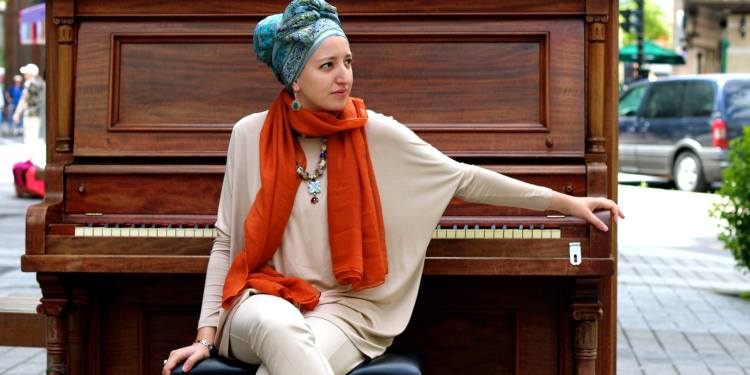Suad Bushnaq is a musically multilingual Arab-Canadian film and concert composer whose music has been hailed as ‘reflective and touching’ (Nikki Bedi, BBC The Arts Hour), ‘seriously beautiful’ (John Welsman, award-winning Canadian composer), ‘rich and accessible’ (Klara Festival, Belgium), and ‘sublime’ (Toula Drimonis, CJAD Montréal). Her film score for The Curve earned critical acclaim and was described as haunting, stunning, and masterful. One of its tracks, The Road to Jenin, was described by Marcel Khalifé as ‘beautiful as the sadness of the night and the joy of the daybreak’.
The Vermont Symphony Orchestra will be performing Suad’s piece Ghadan (Tomorrow) at the Holiday Pops concerts. She had the following to say about her composition:
“Hakawaty’ Suite for Orchestra is a tribute to Abu Shadi-Rasheed Al Hallaq, who is known as El-Hakawati, or ‘The Storyteller of Damascus’. He was an icon of the five-hundred year old café, Al Nofara, in the Old City. He told stories that were woven from reality and imagination, cleverly spun around the lives of those who listen. I used to listen to him while sitting on the patio of that café, drinking mint tea. I was an eighteen year old student at the Higher Institute of Music, fascinated by this city and its charm, which took my breath away. I recently heard that he had sadly passed away.
The suite is composed of five movements which can be played in any order. It is a time capsule of the four years I spent in the Jasmine City, and my countless wanderings in Old Damascus. It is a collection of musical paintings that capture remarkable moments in time. It holds memories of places, colours, scents, people, and flavours. It keeps alive in my heart a place that was the essence of life, and it brings my beloved mother back.
Ghadan (Tomorrow) is a movement that can be played at the very beginning of the suite, or at the very end, as it anticipates a better future for a war-torn country. It is full of hope, with lush, velvety harmonies supporting melodies that build up to create a state of euphoria. If I were to explain the symbolism, it would be that of a city that is regaining its colours and its soul, gradually blooming with the love of its people. The introduction is a ‘pastorale’ scene reflecting the serenity of Old Damascus where mornings have a special flavour. The sun rises gradually until finally, morning breaks. There is a sudden surge of energy that introduces the first theme, and one could imagine the frenzy of shopkeepers opening their stores, while splashing the cobblestone alleys with cold water to cool them off. There is a play in the clarinet on the Muslim call to prayer, mixed with church bells: a juxtaposition that is ever so present in this city, interpreted here in a lighthearted manner. The second theme is a soaring lyrical melody that consists of a playful conversation between the strings and the woodwinds. It is heard a second time after a modulation in the key, this time accompanied by the riq (tambourine), turning it into a stately dance. The movement ends with a fugue in the woodwinds, while a harmonic pedal of heartbeat rhythms is repeated in the strings.
‘Hakawaty’ is for those who know, and those who do not know the Syria I knew. It’s for those who love Syria and realize that it is more than what is seen on the news. It is a country filled with a rich heritage of art and music, and is the Cradle of Civilizations. My daily hope is to go back someday and for everyone to know the Syria I knew.”

